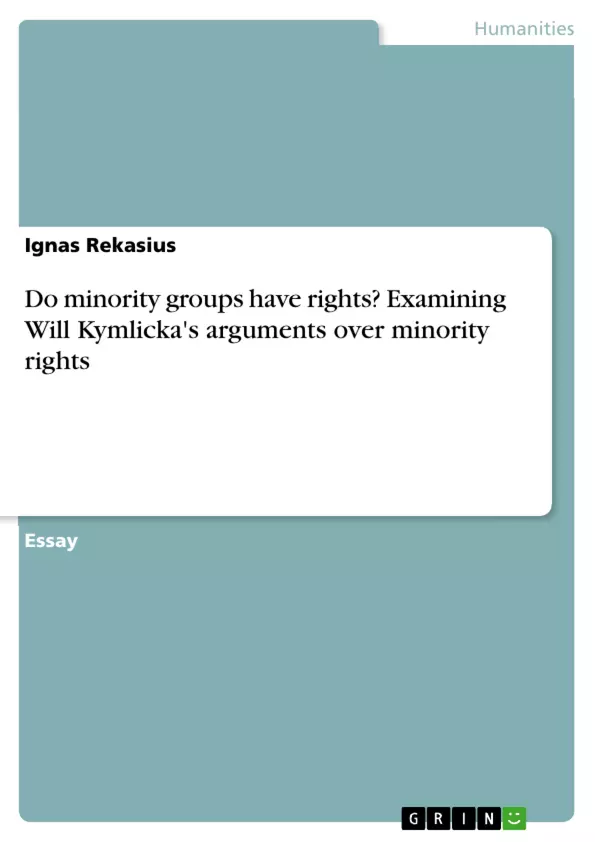From Scottish independence and refugee crisis to the gay liberation movement—numerous ethnic, immigrant and social minority groups began to raise their voices in demand of specific groups rights within a multicultural society today, challenging the libertarian view of nation-building.
In this essay, normative issues raised by distinct minority groups, their relation to the processes of modern-day nation-building and various arguments for and against multiculturalism and integration will be discussed.
In relation to Will Kymlicka’s debate over minority rights, socialist, feminist and radical multiculturalist critiques will be examined so as to unravel the complexities of ethnocultural justice. Finally, an alternative model for societal group relations will be suggested in favour of both ‘protective’ and ‘polyglot’ multiculturalism.
Inhaltsverzeichnis (Table of Contents)
- Do Minority Groups Have Rights?
- Minority Rights Within a Liberal Framework
- Minority Rights and Nation-Building
- Radical Multiculturalism
Zielsetzung und Themenschwerpunkte (Objectives and Key Themes)
This essay examines the issue of minority group rights, discussing the philosophical framework of the liberal-communitarian debate and its implications for modern-day nation-building. The essay critically analyzes Will Kymlicka's arguments for multiculturalism and integration, exploring various critiques and proposing an alternative model for societal group relations.
- The relationship between individual rights and group rights in a liberal democracy
- The role of culture in individual identity and the justification for group-specific rights
- The impact of nation-building processes on minority groups and the challenges of ethnocultural neutrality
- The potential for conflict between individual rights and group solidarity
- The tension between liberal multiculturalism and radical multiculturalist perspectives on minority rights
Zusammenfassung der Kapitel (Chapter Summaries)
- Do Minority Groups Have Rights? This chapter introduces the debate over minority rights, highlighting the historical context and the emergence of ethnic nationalisms in the post-Cold War era. It outlines the significance of minority rights in contemporary political philosophy and the relevance of Will Kymlicka's arguments.
- Minority Rights Within a Liberal Framework This chapter delves into Kymlicka's arguments for multiculturalism, exploring his concept of 'group-specific' rights for national minorities, immigrant groups, and non-ethnic minorities. It discusses the importance of cultural preservation for individual identity and the potential for conflict between individual rights and group rights within a liberal framework.
- Minority Rights and Nation-Building This chapter examines the challenge of recognizing minority rights within nation-building processes. It analyzes Kymlicka's critiques of ethnocultural neutrality and his argument for the necessity of a dominant societal culture in promoting social equality and political cohesion. The chapter also explores the limitations of Kymlicka's approach, particularly in relation to the potential for secession and civil war.
Schlüsselwörter (Keywords)
Minority rights, multiculturalism, integration, nation-building, liberal-communitarian debate, individual rights, group rights, cultural preservation, ethnocultural neutrality, radical multiculturalism, societal group relations.
What is Will Kymlicka's main argument regarding minority rights?
Kymlicka argues that a liberal framework should recognize group-specific rights to ensure ethnocultural justice and protect the identity of national and immigrant minorities.
What is the "liberal-communitarian debate"?
It is a philosophical discussion about whether rights should be focused purely on the individual (liberal) or if the community and culture are essential for individual well-being (communitarian).
How does Kymlicka view "ethnocultural neutrality"?
Kymlicka critiques the idea that states are neutral; he argues that nation-building processes usually promote a dominant culture, which can marginalize minorities.
What are "group-specific rights"?
These are rights granted to specific groups (e.g., self-government for national minorities or polyethnic rights for immigrants) to protect their distinct cultural heritage.
What is the difference between 'protective' and 'polyglot' multiculturalism?
The essay suggests a model that both protects minority cultures from external pressures and encourages a diverse, multi-lingual societal interaction.



